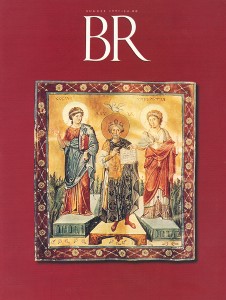The Blood Taboo
Blood should not be ingested because it contains life. Whoever does so is guilty of murder.

Genesis 9:1–4, a priestly text, bans the entire human race from ingesting animal blood:
God blessed Noah and his sons, and said to them, “Be fertile and increase, and fill the earth. The fear and dread of you shall be upon all the beasts of the earth and upon all the birds of the sky, on everything that creeps on the ground, and upon all the fish of the sea; into your hand are they Every creature that lives shall be yours to eat; as with the green grasses, I give you all (these). Only, you shall not eat flesh with its life, that is, its blood.”
Why does the priestly account concede meat to Noah rather than to Adam, who instead is explicitly described as a vegetarian (Genesis 1:29)? Was there a tradition that man the carnivore represented a later stage in the history of the human race? In my initial treatment of the blood prohibition (see “Seeing the Ethical Within the Ritual,” BR 08:04), I cited the Sumerian myth of Lugulbanda, which clearly indicated that such a transition, indeed, was widespread. There is another text, however, that was more likely known to the Israelites and that can be discerned in much of the Bible’s antediluvian epic. It is the Gilgamesh epic.
Already a library member? Log in here.
Institution user? Log in with your IP address.

